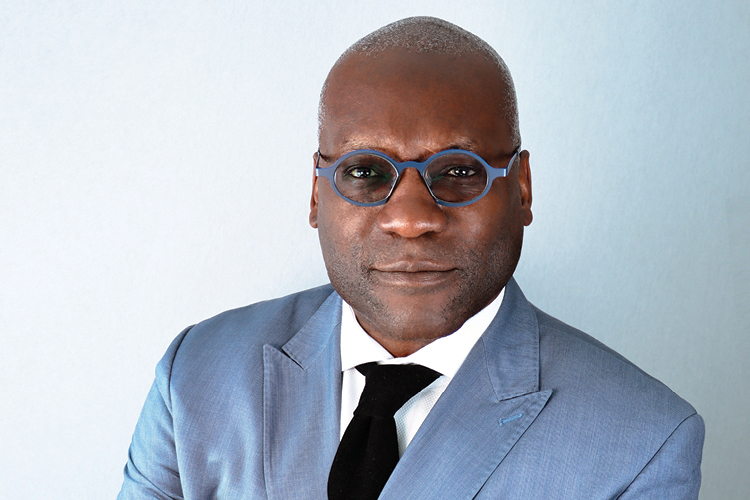Federal Aviation Administration's chief counsel has fought challenges with resolve

Marc Nichols. (Photo courtesy of the Federal Aviation Administration)
Marc Nichols says his life could have easily gone wrong had it not been for his grandmother’s steady love and his own “willful” nature. His father was not involved in raising him. His mother gave birth to him when she was 14, was a drug addict and prostitute, and was in and out of prison throughout his childhood, he says.
Since 2022, Nichols has been chief counsel of the Federal Aviation Administration, where he provides legal advice for all aspects of the FAA’s operations, including questions involving international affairs. One of his biggest challenges has been advising the FAA through the reauthorization process.
“If you see something that’s in the news that relates to the FAA, my office is probably involved in it,” Nichols says.
He describes his career and life’s trajectory not as a straight line leading him to the FAA but more of a wandering path in which he has fought against difficult circumstances and seized opportunities. The key, Nichols says, is to stay determined and embrace change.
“Change can sometimes be your friend. It’s about mental attitude and perseverance,” he adds.
Born in Philadelphia, Nichols and his half-brother were often shuttled between family members. His life was most stable when he was able to live with his grandparents in Utica, New York. But other times, he was living in hotels or in a car. He describes his circumstances as “very impoverished.”
“There were times when I was literally studying, and my mother was doing her prostitution in the next room,” Nichols says. “It was a difficult childhood. My only saving grace is … I was given this talent with my brain, and my grandmother fostered that.”
His brother, Nichols adds, has not fared as well and has found himself on the wrong side of the law.
“I refused to give in to a ‘Woe is me’ attitude about my circumstances, no matter how woeful my circumstances were,” Nichols says.
Nichols stayed in Utica for high school, getting good grades and taking Advanced Placement classes. He was often the only Black student in the class.
“In a lot of ways, being the only Black student in a class helps you learn to navigate how to be different, be the odd one out,” Nichols says. “You learn how to make friends in different groups.”
Nichols was fascinated by the law at a young age, heavily influenced by movies like 12 Angry Men and books like To Kill a Mockingbird and the concepts of justice that both films explored. He graduated from Wabash College in Crawfordsville, Indiana, in 1992. In May 2018, Nichols became the second elected African American as well as the second LGBTQ+ president of the Wabash College Alumni Association.
In 1998, Nichols graduated from the Washington and Lee University School of Law. He started his legal career practicing in private law firms before taking on the role of inspector general in the U.S. Government Printing Office.
Nichols eventually joined Rolls-Royce as global legal counsel, and Saab, where he served as executive vice president, general counsel and corporate secretary. What both companies have in common is that they no longer manufacture automobiles but are heavily focused on defense and civilian aircraft-related products, he explains.
Then, Nichols says, “The White House came calling.”
“One thing led to another, and I was here,” he adds.
Being ‘willful’
Rather than dwelling on whether he’s experienced discrimination or what jobs didn’t work out, Nichols says he concentrates on finding opportunities and learning how to lead.
“I don’t know how many opportunities I lost because people knew I was bisexual or gay or Black or grew up poor,” Nichols says. “As my grandmother always said, I am a very determined person. She would call it willful, but when I make up my mind that I’m going to do something, I don’t let people’s prejudices get in my way.”
He describes this willfulness as a coping mechanism that has allowed him to succeed. In addition, Nichols advises lawyers starting careers to look at their lives in five-year increments rather than worrying about where they’ll be in 20 years.
“If you think about your life in increments, it leaves you open to new opportunities,” Nichols says.
His personal life helps drive him too.
Nichols has been with Jamie, his husband, for 23 years. They married as soon as the U.S. Supreme Court legalized gay marriage in the 2015 landmark decision of Obergefell v. Hodges.
As a child, Nichols rarely interacted with his father. As an adult, he looked up his father on Facebook. Nichols learned his father died in 2018 and that he had eight half-siblings in addition to the brother who was raised with him. Nichols reached out to the others, including Daniel, his youngest half-brother, who ended up orphaned at age 16 when his mother died.
Nichols says Daniel “was pretty close to my father and his mother, and he took it pretty hard when he lost them.”
Nichols and his husband “gingerly” took on helping to raise Daniel, now in his first year of college.
Nichols’ advice to Daniel is to refuse to let other people determine his ability to succeed.
“I tell him to focus on his education,” Nichols says. “Where you start out is not where you need to end up. Education is always a way out. It can take time. It can take patience. It takes hard work to get to a level of success, but it happens.”
This story was originally published in the June-July 2024 issue of the ABA Journal under the headline: “Continuing to Rise: Marc Nichols, the Federal Aviation Administration’s chief counsel, has fought challenges with resolve.”
#MyPathtoLaw celebrates the diversity of the legal profession through stories detailing attorneys' unique and inspiring trajectories.



